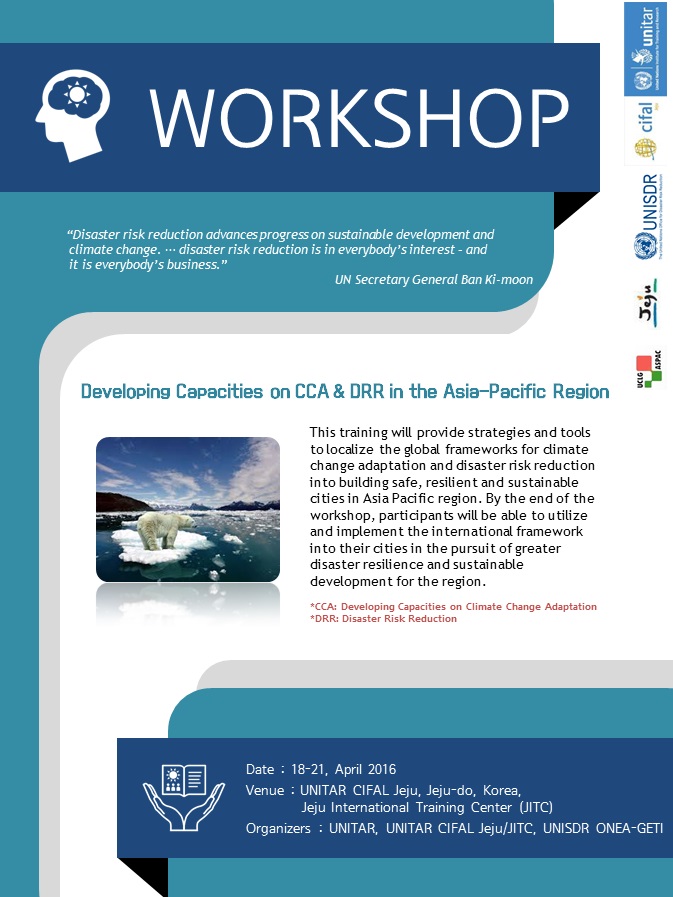Home > Programs >
Social Inclusion
As one of the critical dimensions of sustainable development, social development requires a more holistic, coherent and collaborative approach in designing and implementing national and local policies to make progress towards achieving the Sustainable Development Goals(SDGs).
CIFAL Jeju/JITC provides a variety of training programs to enhance capacity for national and local communities in the Asia-Pacific region to benefit from holistic and multi-disciplinary approaches available in such diverse areas as human trafficking, migration and refugees, urban poor, resilience and disaster risk reduction, making peaceful and inclusive societies, and so on.
CIFAL Jeju/JITC provides a variety of training programs to enhance capacity for national and local communities in the Asia-Pacific region to benefit from holistic and multi-disciplinary approaches available in such diverse areas as human trafficking, migration and refugees, urban poor, resilience and disaster risk reduction, making peaceful and inclusive societies, and so on.
2016 April 18-21: “Workshop on Developing Capacities on Climate Change Adaptation(CCA) and Disaster Risk Reduction(DRR) in the Asia-Pacific Region”

 2016.02.04
2016.02.04

 2016.02.04
2016.02.04
|
in the Asia-Pacific Region" Jeju, Republic of Korea, 18-21 April 2016 (Mon-Thu) Background
“Disaster risk reduction advances progress on sustainable development and climate change. … disaster risk reduction is in everybody’s interest – and it is everybody’s business.” UN Secretary General Ban Ki-moon
In September 2015, member States of the United Nations have adopted the new 2030 Agenda for Sustainable Development. This inclusive and transformative agenda sets the strategic direction for building resilient cities and human settlements by responding to concerns about the impacts of climate change and disaster risk. Prior to the SDGs, the Sendai Framework for Disaster Risk Reduction 2015-2030 was adopted as the first of the post-2015 development instruments and this new framework will have a profound impact on the lives of people for years to come.
In this regard, building resilience and adapting to climate change is crucial for cities especially those in the Asia-Pacific region. The region is subject to all major types of natural hazards and dominates disaster impact categories across the world. During the past decade the region was struck by 1,625 disasters—over 40 per cent of the global total – and half a million people lost their lives. The region has incurred substantial economic damage of more than half a trillion dollars over the same period, accounting for 45% of global total. Unfortunately, planning and development of cities and local government has given little consideration to the consequences of natural hazards, which are at the forefront of disaster.
This training will provide strategies and tools to localize the global frameworks for climate change adaptation and disaster risk reduction into building safe, resilient and sustainable cities in Asia Pacific region. The training process includes lecture sessions with expert inputs combined with real-life case work and best practice. Session-based group work will enable participants to transform in-depth learning into practice and familiarize with coordinated action for decision making. By the end of the workshop, participants will be able to utilize and implement the international framework into their cities in the pursuit of greater disaster resilience and sustainable development for the region.
Event type Workshop
Date 18-21 April 2016
Venue UNITAR CIFAL Jeju/Jeju International Training Center (JITC) Seogwipo-si, Jeju-do, Republic of Korea (Jeju-do is an island located off the southern coast of Korea)
Organizers • UNITAR
Targeted audience This training is open to central and local government officials and other related personnel from NGOs and institutions in the field of disaster risk management and climate change adaptation.
Content The training will include the following: • Module 1: Introducing the concepts and current tendencies • Module 2: Applying Making Cities Resilient(MCR) campaign tools • Module 3: Mainstreaming DRR and CCA into development • Module 4: Developing safe and resilient city action plan • Module 5: Setting indicators for monitoring and evaluation
Learning objectives By the end of the training, participants will be able to: • understand the global framework for climate change adaptation and disaster risk reduction; • build capacities with a focus on effective urban planning and implementation of making cities resilient to disasters; • utilize the operational tools of Sendai Framework at local level to develop city action plan; • identify indicators for monitoring and evaluation of the city action plan; and • share good practices and find ways to cooperate with other participating cities.
Methodology The training will be comprised of: • lectures and presentations by experts • self-assessment exercise and group work • case study presentation • study visit
Requirements Selected applications are required to: • submit necessary documents on time, i.e., registration form etc. • complete and submit pre-training readings and assignments, i.e. case studies etc. • actively participate in the training program • be fluent in written and spoken English
Course certificates UNITAR and UNITAR CIFAL Jeju/JITC will jointly issue a certificate to participants upon completion of the full program.
How to apply Send the following 7 documents to cifaljeju.jitc.1@gmail.com by 28 February 2016 (Sunday):
※ Download forms and guidelines from UNITAR CIFAL Jeju/JITC • Application • Letter of nomination • Letter of commitment • Case study description (see guidelines) • Acknowledgement, waiver and release of liability • Consent to collection, usage and disclosure of personal information • Curriculum vitae (CV) ※ Late application will not be accepted.
Note • Application without required documents will not be considered. • Participation is subject to approval of the application by UNITAR CIFAL Jeju/JITC. • Selected applicants will be notified individually.
Assistance with travel cost • UNITAR CIFAL Jeju/JITC provides a LIMITED (please see the agenda) financial assistance with the airfare to Jeju-do, Republic of Korea. • Local expenses (transportation, accommodation and meals) during the workshop will be covered. • All other expenses are the responsibility of the participants. [이 게시물은 Cifal Jeju님에 의해 2016-05-09 10:06:56 Future에서 이동 됨] |







